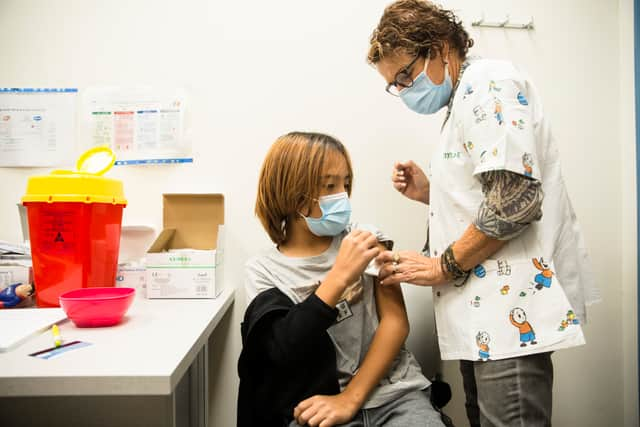Will there be a fourth Covid jab? What experts have said about second booster vaccine - and who could get it
This article contains affiliate links. We may earn a small commission on items purchased through this article, but that does not affect our editorial judgement.


Health experts are currently deciding whether a second Covid booster, and a fourth vaccination overall against the virus, will be offered in the UK next year.
It comes after a study into Omicron by the UK Health Security Agency (UKHSA) showed that, despite a reduction of 50-70% in hospitalisations, protection against the new variant starts to wane by 15-20% around ten weeks after the first booster shot.
Advertisement
Hide AdAdvertisement
Hide AdIsrael has become the first nation in the world to announce that it will press ahead with a fourth vaccine, for all people aged over 60, the clinically vulnerable and healthcare workers.
Meanwhile, Germany’s Health Minister Karl Lauterbach has said that he expects a fourth coronavirus vaccine will be needed.
Tedros Adhanom Ghebreyesus, director general of the World Health Organisation, warned on Wednesday (22 December) that further booster programmes “are likely to prolong the pandemic, rather than end it” because they would divert supply to places with already high vaccination coverage and allow the virus to continue to mutate elsewhere.
But Israel’s former prime minister Naftali Bennett welcomed the recommendation by a government panel on the fourth jab, saying it would help the country get through a potential wave of infections caused by Omicron.
Advertisement
Hide AdAdvertisement
Hide AdSo why might a fourth vaccination be needed, and what’s been said by experts in the UK so far?


What do we know about booster protection?
The UKHSA study showed that the effectiveness of the booster begins to wane by 15%-25% around 10 weeks after the dose.
Among people who received an initial two doses of the Oxford AstraZeneca vaccine, protection was about 60% two to four weeks after a Pfizer or Moderna booster. This then dropped to 35% with a Pfizer booster and 45% with Moderna ten weeks after the vaccination.
The scientists were keen to emphasise the fact that this decline was only seen against mild symptomatic cases - and that protection against severe illness would be significantly higher and long-lasting.
Advertisement
Hide AdAdvertisement
Hide AdWill the UK offer a fourth jab?
It’s still too early to say when and indeed if there will be a fourth jab rollout in the UK.
It is understood that health officials and ministers are reluctant to give the green light to a fourth booster rollout unless absolutely necessary, given the huge cost of the campaigns and the knock-on impact on GPs and other NHS services.
They also believe that the UK’s decision to increase the gap between the first and second doses of vaccine to 12 weeks gave people longer lasting immunity than in other countries.
The counter argument is that Omicron has already become the dominant variant in the UK, leading to record daily case numbers this week, and growing pressure on the NHS.
Advertisement
Hide AdAdvertisement
Hide AdThe Joint Committee on Vaccination and Immunisation (JCVI) has said it will need to examine evidence on the amount of immunity given by the three vaccines currently available, as well as data on hospitalisations for Omicron, before making any decision on a fourth.


While the JCVI has previously been criticised over the length of time it’s taken to make recommendations, its members say that they need more real-world evidence before they can make a decision on a second booster.
A government source told The Times: “There is obviously the possibility that we will need to have another round, in much the same way we do with flu. That is something we are preparing for but our priority is to complete the current booster campaign.”
Professor Anthony Harnden, deputy chair of JCVI, told The Telegraph: “We need to see more data. We are in different circumstances to Israel and we need to see more data on waning immunity and vaccine effectiveness against hospitalisation.”
Advertisement
Hide AdAdvertisement
Hide AdTalking to LBC, Professor Adam Finn, a professor of paediatrics at the University of Bristol and another JCVI member, said: “I think there will be people probably who will receive a fourth jab – whether that will be everyone, I think, is still very much in doubt.”
He added: “I think there may well be people who received their boosters early who are in the older more vulnerable age groups who may need a further jab – that has not been decided yet.
“It is still under review and discussion, and we will be providing recommendations on that at some point in the new year.”
Who might get a second booster?
If the UK follows the example of Israel, and if authorities take the same approach as they have previously in the vaccine rollout, the most vulnerable will be prioritised first.
Advertisement
Hide AdAdvertisement
Hide AdThis is likely to mean the elderly, the clinically vulnerable and frontline health workers.
In the original vaccine rollout, the priority list started with care home residents and staff, followed by the oldest age groups in descending order.
A message from the editor:
Thank you for reading. NationalWorld is a new national news brand, produced by a team of journalists, editors, video producers and designers who live and work across the UK. Find out more about who’s who in the team, and our editorial values. We want to start a community among our readers, so please follow us on Facebook, Twitter and Instagram, and keep the conversation going. You can also sign up to our email newsletters and get a curated selection of our best reads to your inbox every day.
Comment Guidelines
National World encourages reader discussion on our stories. User feedback, insights and back-and-forth exchanges add a rich layer of context to reporting. Please review our Community Guidelines before commenting.